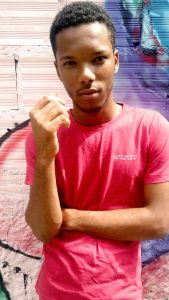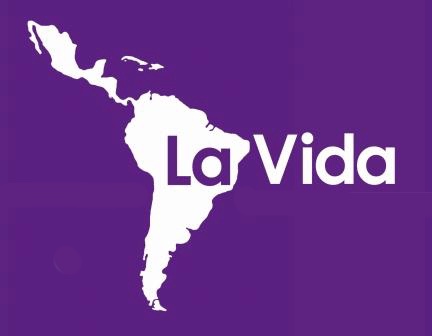Viva a Vida – The story of Vinicius
VINÍCIUS CERQUEIRA, 18 YEARS OLD
 Vinicius joined Viva a Vida in 2014 as a member of V2 Theatre Group and the Vila Jovem Youth Group
Vinicius joined Viva a Vida in 2014 as a member of V2 Theatre Group and the Vila Jovem Youth Group
When Vinicius first approached Viva a Vida he frowned and asked “do you notice anything strange about me?” He watched some of our theatre group’s open rehearsals and couldn’t believe his eyes, but he wasn’t sure about having a male teacher. “I didn’t trust men, I really wanted a female teacher, men used to call me a ‘faggot’.” Gradually he opened up more, “do you see something wrong when you look at me” (his eyes full of tears), “I saw a beautiful boy, is there something wrong with that”, “I don’t know, whenever I go to places or groups, people swear at me and treat me badly, because they think I’m different.”
Evelin (Projects Coordinator) said, “but you are different Vinicius. I can see it in your eyes. You are more sensitive than other boys. You are brave, because you are here, opening your heart to us. For this alone, I would agree, you are very different”. Over time, first with our Instructor Marcos Moreira and then with our Teacher Simone Requiao, Vinicius joined the theatre group. Was he treated differently? Wasn’t he fragile? Yes, he was treated as an equal, accepted as he was. Some of the gestures that made him seem different in other groups were seen as his essence, his way of being.
After three intense years of working, experimenting, exchange visits and laboratory sessions, debates, tears, laughter, overcoming discrimination and empowerment, if we compare Vinicius’ first interview with Viva a Vida in 2014 to our current one, we can see how much there is to celebrate. Vinicius had problems at school, at first he was bullied and then he started bullying others and the school was planning to expel him. Simone talked to the school and asked for some time to address these issues with him. After a lot of supportive work, Vinicius started to change. So much so, that in 2017, to everyone’s delighted surprise, Vinicius opened the school’s Annual Planning day, running the group activity with the teachers and presenting his monologue (part of the In dependence play). It was great to see the teachers’ surprise, they couldn’t believe the change in him, and welcomed the work that had provided him with the opportunity to change.
“It was a complete turnaround, after so much difficulty and some of the bad things I used to do, to be able to go back and show them how much I have changed and how much I have learnt. Today they always congratulate me at the school’s cultural events”.
In his own words, Vinicius, the “frowning, fragile, victimized boy”, has given way to a courageous LGBTT activist, daring to say that he is a feminist, because, as he makes clear, he supports women’s rights too: “I use the term sexuality instead of orientation, because that way I feel I am also supporting the cause of women. It is a gender struggle, both against machismo and for my sexual orientation”. Vinicius sees himself as strong and ready to face up to personal challenges. “What has most helped me at Viva a Vida is having arguments to put forward. Viva a Vida has helped me to overcome each stage, we cannot be the poor victim of the story, I learnt to stop, take a breath, see what’s happening and react… With the theatre and Vila Jovem I have learnt about social and political issues. Without Viva a Vida, I would not know how to argue”.
Vinicius represented the state of Bahia at a national meeting of LGBTT adolescents, which was a huge step for him, “I got to know empowered people and when I came back I started researching things, and we are still discussing them”. Asked about his sexual orientation, Vinicius responds: “I feel secure, when I see someone talking about machismo, homophobia, I get involved straight away. Because people can’t just go around saying what they want.”
At the beginning his mother didn’t like the theatre or his participation in the group, “but today, she comes to watch the plays and asks me loads of questions. Some about sexuality that even make me embarrassed”, he laughs.
What helped him to change so much? Where did he find the support and strength to overcome discrimination. How do you learn to be yourself? How much can projects contribute to this kind of education? Do we think the investment is worth it?
“If it wasn’t for Viva a Vida, I would be frustrated, I wouldn’t have achieved my goals, I wouldn’t have had the experience of theatre, I wouldn’t have the knowledge I have today, I wouldn’t know how to relate to people, I wouldn’t have got to where I am today. Three years ago, I was so introspective and I didn’t trust anyone”.

